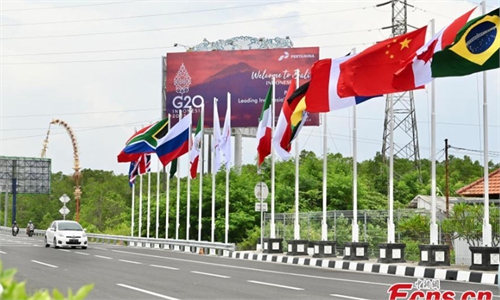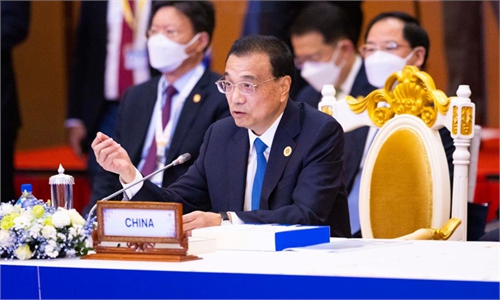China actively promotes digital paradigm, follows win-win and inclusiveness rule to help ASEAN progress

A concept photo of digital economy Photo: VCG
Digital transformation was among the top three areas discussed at the Group of 20 (G20) Summit held in Indonesia. Chinese President Xi Jinping said on Wednesday that China stands ready to continue cooperating with the members of the G20 to jointly build a global digital economic paradigm, featuring benefits for all, balance, coordination, inclusiveness, win-win cooperation and common prosperity.
Xi made the remarks when addressing the 17th G20 Summit, noting that an expanding digital economy and an accelerating global digital transformation have become important factors influencing world economic paradigms, according to the Xinhua News Agency.
Multilateralism must be upheld, he said, calling for strengthened international cooperation. The digital gap must be bridged and innovation should serve as the driving force for promoting post-pandemic recovery.
The digital economy was first put on the G20 agenda in 2016 during the G20 Hangzhou Summit held in China.
With China's vast experience in the digital economy and digital transformation, the country can effectively boost international cooperation, especially with the Association of Southeast Asian Nations (ASEAN) and the developing countries. Expanding digital cooperation is crucial to the world's development, analysts said.
Indonesia looks forward to China's role in the development of ASEAN's digitalization, Indonesian ambassador to China Djauhari Oratmangun said in an interview with the Beijing Daily. It is hoped that by 2025, ASEAN's digital economy scale will exceed $200 billion, he said.
In 2021, China's digital economy stood at 45.5 trillion yuan ($6.5 trillion), ranking second in the world. Emerging technologies such as artificial intelligence, cloud computing, big data, blockchain and quantum information are among the world's top tier, according to a report by the Internet Society of China on Tuesday.
China has already taken action. It will launch China-ASEAN Digital Talents Training Project to train 1,000 professionals for ASEAN in the next three years, and support leading Chinese provinces in the digital economy, such as East China's Zhejiang, to harness their strengths and enhance cooperation with ASEAN members.
China has attained experiences in digitalizing traditional industries. It is important to pass on Chinese enterprises' experience and technology to the ASEAN market, Pan Helin, co-director of the Research Center for Digital Economics and Financial Innovation at Zhejiang University, told the Global Times on Wednesday.
"ASEAN and other developing economies are slightly behind China in digitalization, especially the lack of representative internet enterprises," said Pan.
Wang Peng, an assistant professor at the Gaoling School of Artificial Intelligence at the Renmin University of China, said that enterprises are the core of China's cooperation with ASEAN in the digital economy.
"Chinese companies have the capital, strength and experiences to bring direct investment or joint projects," Wang told the Global Times on Wednesday.
Chinese companies are actively promoting digitalization process in Southeast Asia. Indonesia's largest tech company ToGo is an example. It was formed by the merger of two unicorns, Gojek and Tokopedia, which were previously separately backed by Tencent and Alibaba.
In 2021, a wireless base station in Indonesia built by Huawei covered more than 1 million residents of Papua, allowing locals to have access to 4G communications for the first time.
Universally, the coronavirus pandemic has forced the private sector to shift to digital and hybrid working arrangements. Businesses can have their teams operate remotely, leveraging AI and cloud technology. The pandemic has pushed many traditional companies online at a rapid pace, a spokesperson of Tencent told the Global Times on Wednesday.
"Based on our experience as a global technology company, I believe there has never been a better time for Tencent to help local economies to transform and continue to bring our mission of 'Value for Users, Technology for Good' to help transform ASEAN economies," said the Tencent spokesperson.
There's been a significant increase in cloud adoption by businesses of varied size in Southeast Asia, which has accelerated after the breakout of the pandemic, according to Tencent Cloud.
Tencent has set up several internet data centers in Southeast Asia, with two in Indonesia, two in Thailand and four in Singapore, serving industries from financial services, media, entertainment, retail, to manufacturing and gaming.
But there are challenges in digital cooperation between China and other countries and in digital transformation and development among local enterprises, analysts said.
"China's digitalization experiences need to be integrated with local development conditions, so that Chinese enterprises can realize commercial operation to help boost local digital transformation," said Wang.
The spokesperson of Tencent said that although the use of cloud technology is ideal, there are still challenges facing SMEs in digital transformation, notably the need for cloud usability, costs, connectivity and support services.



